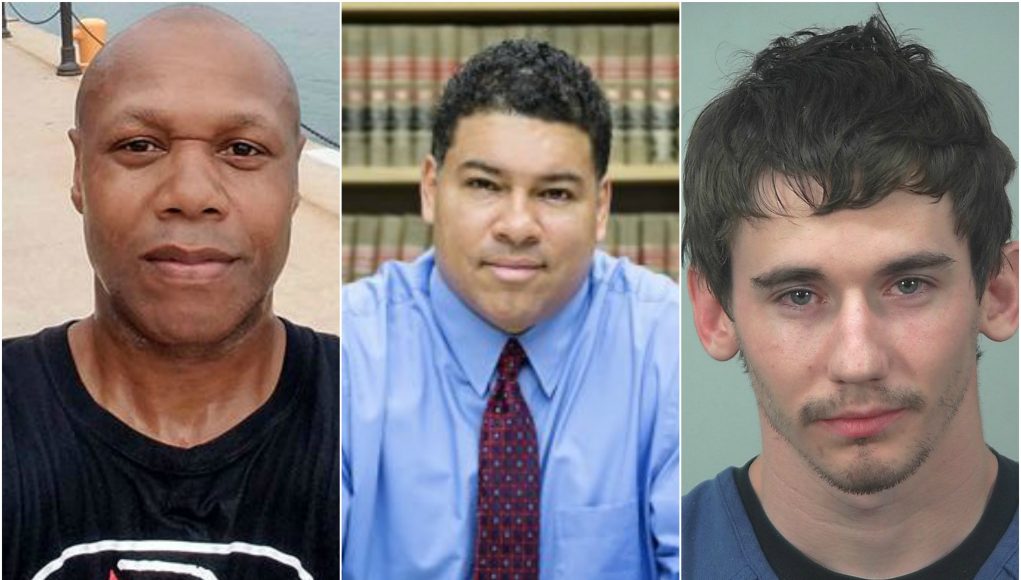Yesterday we brought you the story of Trent Jackson, the prominent community leader and beloved former Badger who suffered an unprovoked racist attack in December. The story, which we presented as factually as possible, brings up a lot of issues with the police, the district attorney, and the community that we think need to be addressed. Right now.
You can read our whole story here, or Trent’s first-person account, which reads like a scene from Mississippi Burning, here. But here’s the short version:
Two men rolled up on Trent at around 10 pm as he was out walking his wife’s little dog. One of them shouted racial slurs from the backseat, which Trent ignored. Emboldened by alcohol, 23-year-old Austin Bossaer got out of the car and pushed Trent in the chest, all while spewing racist slurs. Trent took a swing in self-defense, but missed. The driver of the car, Jordan Volz — who Trent says was also visibly intoxicated — then got out and bull-rushed Trent, who clocked him in the nose.
Almost three hours later, around 12:40 am, police showed up three deep at Trent’s house to hear his side of the story. Trent learned that the white men alleged that he had attacked them, which might explain why the police felt they needed three officers to interview Trent. Ultimately, though, they believed Trent and decided to arrest Austin for disorderly conduct with a hate crime enhancer. They let Jordan go — despite the fact that Jordan seemed intoxicated and police knew he had been driving — since Trent’s fist had already given him “swift justice.”
Trent was later contacted by the office of Ismael Ozanne, the first black District Attorney in Dane County history. He was told Ozanne had decided that Austin should go through Community Restorative Court, where he would have to take accountability and apologize, but would come through with a clean record. Trent would have to approve, though, which Trent says he was “strongly encouraged” to do, because Austin would just get a “slap on the wrist” in traditional court.
(Ozanne couldn’t comment on this specific case, but hinted that part of the reason to send a case to CRC is that the DA thinks he might not be able to prosecute it.)
Let’s stop right there.
We can hear some of your White Privilege detectors going off. Yeah, there is white privilege all over this story. We have one guy who’s apparently driving drunk and attempts an assault but gets off entirely. And we have a DA who just assumes the system is going to go easy on the other guy. The other white guy.
Let’s turn the tables for a minute.
Let’s imagine this is two young Black men, drunk, rolling up on a white guy out walking his dog, yelling about, “hey cracker, f**k you and your little dog.” Let’s imagine everything else plays out the same. Let’s say the white guy gets the best of them, gets in a clean punch and breaks a guy’s nose. Let’s say police talk to the Black guys first and then the white guy.
Do you think they’d feel the need to bring three officers to the white guy’s house?
Do you think they’d let one of those Black guys walk away?
Do you think the DA would think, “Oh, I can’t prosecute this case, better send it to community court?”
Now let’s add a bit to the story … what if one of those Black guys lives in Chicago and is just in town for the weekend? And what if the other just moved to town six months earlier? And what if the one they arrested turns out to be armed with a knife?
Because all those things are part of this case, too.
Jordan lives in Indiana and was just in town for the weekend. Austin is not a lifelong member of our community. And when they arrested Austin, police found a knife in his pocket — a fact that no one told Trent when they were trying to convince him to let the case go to community court.
If you honestly believe, if the tables were turned, that police would allow a drunk Black man from Chicago to walk away, and that Ozanne would choose not to prosecute a Black man charged with a racially motivated assault while armed with a knife … you’re just not being honest with yourself.
This isn’t just speculation. We have data. We know black men are 11 times more likely to be arrested than white men in Dane County, even though they don’t commit 11 times as many crimes. We know black men face stiffer penalties and are more likely to do time than white people convicted of the same crimes.
Beyond the obvious double standards in play here, we see a couple of issues in the system that need to be addressed.
First of all, to District Attorney Ozanne, if you can’t prosecute this case — if you can’t get anything more than a “slap on the wrist” for a racially motivated attempted assault — what hate crimes can you prosecute? Would Trent need to be beat up? Hospitalized? Stabbed with that knife Austin had in his pocket?
Secondly, Community Restorative Court is, generally, a positive idea. A youthful mistake like shoplifting or starting a fight can put your name permanently in the court records, which can then become an obstacle to employment and success, which can then lead to more crime. This is especially true for young people of color, because of those arrest disparities we just mentioned. An alternative to traditional court is a good thing to even out some of those disparities.
But is it appropriate to use this system for someone who basically stalked a black man who was just minding his business? A man who even the police said committed a hate crime?
Is it appropriate to “strongly encourage” a victim to allow a case to go to community court without giving the victim all the information on the case?
We say nah and nah.
At a minimum, Community Restorative Court procedures must be changed to ensure that victims receive a copy of every police report related to their case before they approve letting their case go through CRC.
And CRC should not be used to adjudicate hate crimes.
If the District Attorney is worried that he can’t win a hate crime case, that’s a District Attorney problem, not a community problem.
Sure, send small cases to CRC. Give those low-level offenders a second chance.
But there’s no such thing as a small, low-level hate crime.
Sure, in this case, things seem to have worked out ok. Trent sat and talked with Austin, who cried and apologized. Austin is writing his essays and doing his community service, and Trent says he forgives the young man.
Good for Trent.
We have no reason not to believe Trent when he says he is at peace and ready to move on. But we also must recognize that our society expects grace and forgiveness from our Black folks. And that Black folks are not supposed to criticize the police or the authorities.
Let’s turn those tables again.
If Trent said he just couldn’t forgive these guys, he would be ostracized. If he publicly criticized the police or the DA, he’d be called an Angry Black Man, a reverse racist. And, let’s be real, might start seeing police cars rolling slowly past his house at night. (Ask Brandi Grayson.)
If, on the other hand, our fictional white man said he just couldn’t forgive those Black “thugs” (cuz you know that word would have come up by now), and wanted them sent up the river for their racist hate crime, that’d be just fine.
Trent forgives these young men because he is a graceful, generous man. But let’s be honest — we, as a culture, expect grace and generosity of our Black folks. That’s why Black Lives Matter makes so many white people uncomfortable — Black people are supposed to be docile and quiet, even in the face of virulent racism. Especially in the face of virulent racism. (Ask Colin Kaepernick.) Black people are expected not to criticize the system, nor the police, even when all they’re asking for is that the system work for them the way it works for white people.
Are we reasonable to expect that?
That’s not a policy question, really. It’s a cultural one. A difficult thing to consider as a culture.
Some might say we don’t have to consider that question, because everything is fine, because Trent says he’s fine.
But let’s not lay it on Trent to tell us this is fine.
Trent has found a way to forgive. Great. But let’s not pretend hate crimes are just like all other crimes.
Let’s not rely on the gentleness, grace and generosity of Black people. Let’s put hate crimes where they belong, in the criminal justice system.
This opinion piece does not necessarily represent the views of Madison365’s board of directors, sponsors or any individual contributor.




























